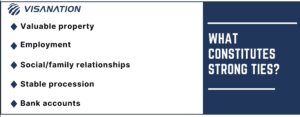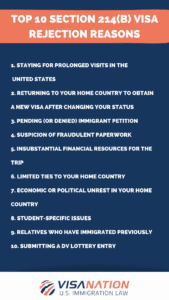

Has your visa been rejected by a consular officer under Section 214(b) of the Immigration and Nationality Act? Millions of visas are denied each year under this section of law. If this is your scenario, you may be confused and wondering what that means and if there is any way to get around it. U.S. immigration law is set up where the burden falls on the visa applicant to demonstrate that they do not intend to stay permanently in the United States and meet the requirements to receive the visa. In this post, we will explore what 214(b) refusal means and how it may apply to the considerations of your visa application even if you received a 213(b) slip. Keep in mind that rejection under this section applies to family immigration and employment-based immigration.
According to the U.S. Department of State Bureau of Consular Affairs, Section 214(b) of the Immigration and Nationality Act states:
Every alien (other than a nonimmigrant described in subparagraph (L) or (V) of section 101(a)(15), and other than a nonimmigrant described in any provision of section 101(a)(15)(H)(i) except subclause (b1) of such section) shall be presumed to be an immigrant until he establishes to the satisfaction of the consular officer, at the time of application for a visa, and the immigration officers, at the time of application for admission, that he is entitled to a nonimmigrant status under section 101(a)(15). An alien who is an officer or employee of any foreign government or of any international organization entitled to enjoy privileges, exemptions, and immunities under the International Organizations Immunities Act, or an alien who is the attendant, servant, employee, or member of the immediate family of any such alien shall not be entitled to apply for or receive an immigrant visa, or to enter the United States as an immigrant unless he executes a written waiver in the same form and substance as is prescribed by section 247(b).
Essentially, it is the officer’s responsibility to determine if you qualify to get a temporary visa based on the information you provided and their short interaction with you. One of the primary consideration factors in deciding if you have the intention to abandon your country of residence and stay in the United States. For that reason, having “strong ties” to your country is important to establish with your immigration case. These ties can be a career, a family to take care of, real estate, other commitments, etc. If, for example, you are unemployed, not married, and do not have children or own any real estate, these could be red flags from the consular officer’s point of view that you may be an intending immigrant. Strong ties for a minor can mean things like educational plans, grades, etc.
The rejection means the visa you applied for was not approved based on one facet of the immigration law outlined in 214(B). We list some of the common reasons in the section below but one of the most prevalent is an intention to stay in the U.S. past the terms of the visa. This can be deduced by weak ties to your home country or more overtly by stating you have plans to stay in the United States. It is possible to reapply after a rejection, with guidance from a qualified immigration attorney.

In practice, there are numerous reasons why you may receive 214(b) slip rejections. Below are the top 5 reasons your visa may have been denied under Section 214(b):
1. Staying for prolonged visits in the United States
If the consular officer sees that you have stayed for extended periods of time in the U.S., the officer may believe that you are not living in your home country or are an intending immigrant.
2. Returning to your home country to obtain a new visa after changing your status
Immigration officials can interpret this as deceptive if they believe your real intent from the first visa application was to change your status. For example, if you first received a tourist visa and then changed your status to a work visa after arriving.
3. Pending (or denied) immigrant petition
If you have previously been denied an immigrant petition or have one pending, this can be a red flag for officials because it is clearly an intent to immigrate to the U.S. Moreover, these officials can defer to that prior denial and state there is no change in your circumstances if that is the case. You may be asked what has changed since you previously applied for a visa from immigration officials. Always discuss this in advance with your lawyer. Do not assume that changing the reason for your trip will improve your odds of getting the visa because that can signal desperation to the immigration officials.
4. Suspicion of fraudulent paperwork
Any inkling that you have submitted fraudulent documents for your case can be cause for denial.
5. Insubstantial financial resources for the trip
Not having solid financial support for your trip can cause concern with officials because you become a risk of being a public charge or having to seek unauthorized employment in the U.S. to pay for expenses. For example, if you are applying for the visa to receive medical care but cannot prove the wherewithal to pay, you may be denied under section 214(b).

6. Limited ties to your home country
Individuals who are not married, unemployed or have low-paying jobs, no children, no property or assets may be more suspected.
7. Economic or political unrest in your home country
Countries that are suffering chaotic economic or political landscapes tend to see a higher percentage of 214(b) refusals for their citizens/residents
8. Student-specific issues
Sometimes, students will be denied by the consular officer because of things like poor grades or attendance while in school in the U.S., no adult-like economic ties to their home country, insufficient grasp of English, a student older in age (over 30), etc.
9. Relatives who have immigrated previously
Individuals with relatives in the United States won’t automatically be denied but it can raise concerns about the applicant’s intentions, especially if the relative gained their status in a way that the consular officer considers objectionable (i.e., B to asylum). Discuss this further with your immigration attorney to be prepared with counterarguments.
10. Submitting a DV Lottery Entry
Although the majority of consular officers don’t attach significance to the act of entering the lottery, there are a few who do consider it. Naturally, if an individual is chosen as a “winner” of the lottery and proceeds to submit an application for an immigrant visa, this action will be viewed as displaying immigrant intent. Therefore, acquiring a nonimmigrant visa while the immigrant process is underway or following an immigrant visa denial could pose challenges.
Although there is no official appeal process for this type of denial, if you face a 214(b) visa denial based on not having strong ties to your country of residence, it is possible to have the denial reversed if you can provide evidence that you have these ties. A qualified immigration professional is the best one to help you gather the appropriate evidence and make your case. Some factors they may have you consider include whether you accurately described your home situation, any tie(s) you neglected to mention, or additional information you can include in your case.
There are many USCIS appeals and motions that you might find useful.
It is necessary to mention that if you are reapplying for your visa after receiving a 214(b) denial, you will be responsible for paying the application fees again. They are non-refundable whether or not that visa is approved. You will also need to have an interview with a consular officer again. Always prepare for the interview process with your lawyer to anticipate any questions that may arise in light of the new information you are providing for your case. The verbal answers you provide during the interview with the immigration official will weigh heavily on the decision. Always be polite to immigration officials and if you do not understand a question, ask them to clarify.
If you are a student reapplying after a denial, it can be very beneficial to bring Form I-20, Certificate of Eligibility for Nonimmigrant Student Status, along with you.
Find out about family green card interview questions and prepare for the interview.
The “presumption of immigrant intent” is a major hurdle you may face if you received a 214(b) slip which means visa denial. Much like being guilty until proven innocent, you will have to prove beyond a shadow of a doubt that your intentions are honest and not to overstay the authorized length of the visa you receive. While some visa ineligibilities can be overcome, and the Department of Homeland Security can authorize a waiver, that is not the case for all immigration cases.
The good news is that it is possible to overcome a 214(b) visa rejection, with the right strategy. The first step is to identify the rejection reason itself. A qualified immigration attorney will best be able to help you identify the 214(b) visa rejection reason. You can contact the consulate in your home country as one way of finding out. From there you can begin the reapplication process. The consular officer will likely consider a second application if you can provide new and relevant evidence showing you have strong ties outside of the United States and can show how your circumstances have changed since originally applying.
Case Study: We had a client from South America who originally applied for a visitor visa to travel to the United States to visit his sister living in Virginia. Low and behold, he received a denail under 214(b) because the consular officer made an inference that he would not come back to his home country. This decision came out of the blue and our client wasn’t expecting to have to address this concern. We helped him gaather the appropriate evidence and documents to show he had strong ties to his home country. When the time came for him to meet the consular officer again he was prepared, with our help! We helped him outline all the reasons why he had a responsiblity to return to his country along with documents to support it.
Schedule a Consultation
Below you will find answers to the most commonly asked questions about the topic:
Can I get the money I paid for my visa back if I am ineligible?
Unfortunately, the government will not return the application processing fee since it is non-refundable. Therefore, if you choose to reapply for the visa, you will need to pay the application fees again (non-refundable whether or not that visa is approved).
Is there an appeal process after receiving a 214(b) denial?
While there is no appeal process, nothing stops you from reapplying and showing new credible evidence to the immigration official. The burden falls on you to prove that you would be a good candidate for the visa and that you have no intentions of remaining in the U.S. To ensure the highest chances of getting an approval the second time around it’s advised to seek counsel from an immigration attorney.
If I bring more documents, do I have a better chance of getting approved?
Not necessarily, but the documentation you bring is important for the officer to get a comprehensive picture of your case. Be sure to carefully review the documentation with your immigration lawyer before the interview.
What do “strong ties” mean?
Strong ties refer to an aspect of your life that keeps you rooted in your country of residence. These can include jobs, family, home, bank accounts, financial responsibilities, etc. Any indication (economic, social, cultural) that you will not abandon your country after visiting the United States on your visa can be beneficial to provide immigration officials. You can include documents like property titles, bank documents, marriage documents, salary declarations, etc.
Who can I talk to if my family member or friend was denied a visa under section 214(b)?
While you cannot talk directly to the Department of State about someone else’s visa decision, you can recommend to your friend or relative to reexamine the information they provided to immigration officials and if they left out any information if they included specific details about the strong ties to the country of residence and tell them that they can reapply again.
What is Section 214(B) for a U.S. visa?
Section 214(b) is a part of the Immigration and Nationality Act, making you ineligible to receive a nonimmigrant visa based on a presumption of being an intending immigrant or not meeting one of the other eligibility requirements for the visa category you applied for.
What is the Immigration and Nationality Act (INA) 214(b) Section?
The rejection means the visa you applied for was not approved based on one facet of the immigration law outlined in 214(B). One common reason is indicating to immigration officials an intention to remain in the United States past the terms of the visa you are applying for. This can be as indirect as not having strong ties to your home country (family, career, property, etc.) or as blatant as saying you have plans to stay in the U.S. In some cases, you can reapply after a 214(b) rejection, so not all hope is lost.
What is visa revocation?
Consular officers will sometimes carry out what is called visa revocation based on “new information that came to light after visa issuance.” The new information must create enough doubt that officers can construe that the visa applicant no longer qualifies for the visa and can be denied under the 214(b) eligibility requirements.
How do you get over 214(b) rejection?
It is possible to have certain visa ineligibilities overcome with the proper documentation. Similarly, you can reapply if your visa application was denied the first time but be sure to bring the best supporting evidence for your case. To follow through with reapplying, contact the U.S. consulate/embassy in your country and ask them about the steps. Before going through with the application, examine if there are any important considerations that the officer missed for your situation and, if possible, provide additional evidence to support your situation.
I was denied under 214(b) as a student. What should I do?
If you are a student and were denied a visa, then either you did not demonstrate that you were a bonafide student, you had the financial support to pay for your studies in the U.S., or that you had strong enough ties in your home country to have the immigration official feel confident you would return after your visa elapsed. With that said, you can reapply for the visa. If you choose to do so, you should bring adequate evidence to the officer demonstrating that you have every intention to leave the U.S. after you complete your studies. The I-20, Certificate of Eligibility for Nonimmigrant Student Status, is one useful document that you can bring. If you indicate to the officer that you have an intention to pursue your career in the U.S. after your studies are over, you will likely be denied.
Why can’t I get a tourist visa if I currently have an immigrant visa that is pending?
Should you currently have an immigrant visa pending and attempt to simultaneously get a tourist visa, that will be a red flag for officials because you clearly intend to immigrate to the U.S., which warrants disqualification of a tourist visa under section 214(b) of the INA. Moreover, having a spouse who lives permanently in the U.S. will also raise suspicion of your intent to stay in the United States if granted a tourist visa. Therefore, if you find yourself facing these challenges, it is imperative to have a qualified immigration professional help bolster your case.
There are a number of ways you and your attorney can decide to handle a 214(b) visa denial. VisaNation Law Group’s immigration lawyers have years of experience helping qualified individuals immigrate to the U.S. through their employment and family-based paths. The best way to avoid an unwarranted denial is to have an immigration attorney file the paperwork on your behalf. Schedule a consultation with our team to get started!